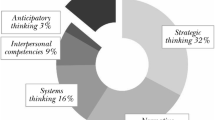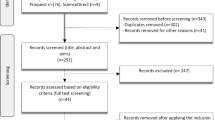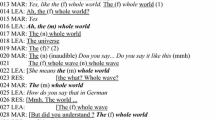Abstract
In this chapter, we will highlight the current status, the potential challenges and learning opportunities afforded by socioscientific issues (SSI)) to deal with sustainability education within the science curriculum. As such, we have collected and reviewed studies related to SSI to provide the background for and a possible lens through which we can view the discussions that follow in this book. Then, innovative approaches will be described that provide opportunities for further developing research and practice in this field.
Access this chapter
Tax calculation will be finalised at checkout
Purchases are for personal use only
Similar content being viewed by others
References
Amos, R., Knippels, M.-C., & Levinson, R. (2020). Socio-scientific inquiry-based learning: Possibilities and challenges for teacher education. In M. Evagorou, J. A. Nielsen, & J. Dillon (Eds.), Science Teacher Education for Responsible Citizenship (pp. 41–61). Springer. https://doi.org/10.1007/978-3-030-40229-7_4
Arastoopour, G., & Shaffer, D. W. (2013). Measuring social identity development in epistemic games. In CSCL 2013 Conference Proceedings (Vol. 1, pp. 42–48).
Badia, A., & Liesa, E. (2020). Experienced teachers’ identity based on their I-positions: An analysis in the Catalan context. European Journal of Teacher Education, 1–16. https://doi.org/10.1080/02619768.2020.1795122
Bayram-Jacobs, D., Henze, I., Evagorou, M., Shwartz, Y., Aschim, E. L., Alcaraz-Dominguez, S., Barajas, M., & Dagan, E. (2019). Science teachers’ pedagogical content knowledge development during enactment of socioscientific curriculum materials. Journal of Research in Science Teaching, 56(9), 1207–1233. https://doi.org/10.1002/tea.21550
Buchanan, R., & Olsen, B. (2018). Teacher identity in the current teacher education landscape. In Research on Teacher Identity (pp. 195–205). https://doi.org/10.1007/978-3-319-93836-3_17
Chang, J., & Park, J. (2020). Developing teacher professionalism for teaching socio-scientific issues: What and how should teachers learn? Cultural Studies of Science Education, 15(2), 423–431. https://doi.org/10.1007/s11422-019-09955-6
Chen, L., & Xiao, S. (2021). Perceptions, challenges and coping strategies of science teachers in teaching socioscientific issues: A systematic review. Educational Research Review, 32, Article 100377. https://doi.org/10.1016/j.edurev.2020.100377
Dimenäs, J., & Alexandersson, M. (2012). Crossing disciplinary borders: Perspectives on learning about sustainable development. Journal of Teacher Education for Sustainability, 14(1), 5–19. https://doi.org/10.2478/v10099-012-0001-0
Eilks, I. (2015). Science education and education for sustainable development - justifications, models, practices and perspectives. Eurasia Journal of Mathematics, Science and Technology Education, 11(1), 149–158. https://doi.org/10.12973/eurasia.2015.1313a
Evagorou, M., & Dillon, J. (2020). Introduction: Socio-scientific issues as promoting responsible citizenship and the relevance of science. In Contemporary Trends and Issues in Science Education (Vol. 52, pp. 1–11). https://doi.org/10.1007/978-3-030-40229-7_1
Friedrichsen, P. J., Ke, L., Sadler, T. D., & Zangori, L. (2020). Enacting co-designed socio-scientific issues-based curriculum units: A case of secondary science teacher learning. Journal of Science Teacher Education, 32(1), 85–106. https://doi.org/10.1080/1046560X.2020.1795576
Friedrichsen, P. J., Sadler, T. D., & Zangori, L. (2020). Supporting teachers in the design and enactment of socio-scientific issue-based teaching in the USA. In M. Evagorou, J. A. Nielsen, & J. Dillon (Eds.), Science Teacher Education for Responsible Citizenship (Vol. 52, pp. 85–99). Springer. https://doi.org/10.1007/978-3-030-40229-7_6
Furman, M., Taylor, I., Luzuriaga, M., & Podestá, M. E. (2020). Getting ready to work with socio-scientific issues in the classroom: A study with argentine teachers. In Contemporary Trends and Issues in Science Education (Vol. 52, pp. 133–151). https://doi.org/10.1007/978-3-030-40229-7_9
Han-Tosunoglu, C., & Lederman, N. G. (2021). Developing an instrument to assess pedagogical content knowledge for biological socioscientific issues. Teaching and Teacher Education, 97. https://doi.org/10.1016/j.tate.2020.103217
Kapici, H. O., & Ilhan, G. O. (2016). Pre-service teachers’ attitudes toward socioscientific issues and their views about nuclear power plants. Journal of Baltic Science Education, 15(5), 642–652.
Kilinc, A., Demiral, U., & Kartal, T. (2017). Resistance to dialogic discourse in SSI teaching: The effects of an argumentation-based workshop, teaching practicum, and induction on a preservice science teacher. Journal of Research in Science Teaching, 54(6), 764–789. https://doi.org/10.1002/tea.21385
Lee, H. (2016). Conceptualization of an SSI-PCK framework for teaching socioscientific issues. Journal of the Korean Association for Science Education, 36(4), 539–550. https://doi.org/10.14697/jkase.2016.36.4.0539
Levinson, R. (2013). Practice and theory of socio-scientific issues: An authentic model? Studies in Science Education, 49(1), 99–116. https://doi.org/10.1080/03057267.2012.746819
Levinson, R. (2018). Introducing socio-scientific inquiry-based learning (SSIBL). School Science Review, 371.
Magnusson, S., Krajcik, J., & Borko, H. (1999). Nature, sources, and development of pedagogical content knowledge for science teaching. In J. Gess-Newsome & N. G. Lederman (Eds.), Examining pedagogical content knowledge: The Construct and its Implications for Science Education (pp. 95–132). Springer. https://doi.org/10.1007/0-306-47217-1_4
Ministry of Education of Taiwan. (2014). Curriculum guidelines of 12-year basic education.
Ministry of Education of Taiwan. (2018). Curriculum guidelines in science of 12-year basic education.
Morin, O., Simonneaux, L., & Tytler, R. (2017). Engaging with socially acute questions: Development and validation of an Interactional Reasoning Framework. Journal of Research in Science Teaching, 54(7), 825–851.
Olsen, B. (2014). Learning from experience: A teacher-identity perspective. In Learning teaching from experience: Multiple perspectives and international contexts (pp. 79–94). Bloomsbury. https://doi.org/10.5040/9781472593313.ch-005
Owen, R., Macnaghten, P., & Stilgoe, J. (2012). Responsible research and innovation: From science in society to science for society, with society. Science and Public Policy, 39(6), 751–760. https://doi.org/10.1093/scipol/scs093
Owens, D. C., Sadler, T. D., & Friedrichsen, P. (2021). Teaching practices for enactment of socio-scientific issues instruction: An instrumental case study of an experienced biology teacher. Research in Science Education, 51(2), 375–398.
Phillips, M., Siebert-Evenstone, A., Kessler, A., Gasevic, D., & Shaffer, D. W. (2021). Professional decision making: Reframing teachers’ work using epistemic frame theory. In Advances in Quantitative Ethnography (pp. 265–276). https://doi.org/10.1007/978-3-030-67788-6_18
Presley, M. L., Sickel, A. J., Muslu, N., Merle-Johnson, D., Witzig, S. B., Izci, K., & Sadler, T. D. (2013). A framework for socio-scientific issues based education. Science Educator; Johnson City, 22(1), 26–32, Article EJ1062183. Retrieved from https://files.eric.ed.gov/fulltext/EJ1062183.pdf
Roberts, D. A., & Bybee, R. W. (2014). Scientific literacy, science literacy, and science education. In Handbook of Research on Science Education, II. https://doi.org/10.4324/9780203097267.ch27
Sadler, T. D. (2004). Informal reasoning regarding socioscientific issues: A critical review of research. Journal of Research in Science Teaching, 41(5), 513–536. https://doi.org/10.1002/tea.20009
Sadler, T. D. (2011). Situating socioscientific issues in classrooms as a means of achieving goals of science education. In T. D. Sadler (Ed.), Socio-scientific issues in the classroom: Teaching, learning and research (pp. 1–9). Springer. https://doi.org/10.1007/978-94-007-1159-4_1
Sadler, T. D., Amirshokoohi, A., Kazempour, M., & Allspaw, K. M. (2006). Socioscience and ethics in science classrooms: Teacher perspectives and strategies. Journal of Research in Science Teaching, 43(4), 353–376. https://doi.org/10.1002/tea.20142
Sadler, T. D., Foulk, J. A., & Friedrichsen, P. J. (2017). Evolution of a model for socio-scientific issue teaching and learning. International Journal of Education in Mathematics, Science and Technology, 5(2), 75–87. https://doi.org/10.18404/ijemst.55999
Shaffer, D. W. (2006a). Epistemic frames for epistemic games. Computers & Education, 46(3), 223–234. https://doi.org/10.1016/j.compedu.2005.11.003
Shaffer, D. W. (2006b). How computer games help children learn (1st ed.). Palgrave Macmillan. https://doi.org/10.1057/9780230601994
Shaffer, D. W., Hatfield, D., Svarovsky, G. N., Nash, P., Nulty, A., Bagley, E., Frank, K., Rupp, A. A., & Mislevy, R. (2009). Epistemic network analysis: A prototype for 21st-century assessment of learning. International Journal of Learning and Media, 1(2), 33–53. https://doi.org/10.1162/ijlm.2009.0013
Simonneaux, L., & Simonneaux, J. (2008). Students’ socio-scientific reasoning on controversies from the viewpoint of education for sustainable development. Cultural Studies of Science Education, 4(3), 657–687. https://doi.org/10.1007/s11422-008-9141-x
Tidemand, S., & Nielsen, J. A. (2017). The role of socioscientific issues in biology teaching: From the perspective of teachers. International Journal of Science Education, 39(1), 44–61. https://doi.org/10.1080/09500693.2016.1264644
Topçu, M. S., Foulk, J. A., Sadler, T. D., Pitiporntapin, S., & Atabey, N. (2018). The classroom observation protocol for socioscientific issue-based instruction: Development and implementation of a new research tool. Research in Science & Technological Education, 36(3), 302–323. https://doi.org/10.1080/02635143.2017.1399353
Wolfensberger, B., Piniel, J., Canella, C., & Kyburz-Graber, R. (2010). The challenge of involvement in reflective teaching: Three case studies from a teacher education project on conducting classroom discussions on socio-scientific issues. Teaching and Teacher Education, 26(3), 714–721. https://doi.org/10.1016/j.tate.2009.10.007
Zeidler, D. L. (2014). Socioscientific issues as a curriculum emphasis: Theory, research, and practice. In N. G. Lederman & S. K. Abell (Eds.), Handbook of research on science education (Vol. 12, pp. 697–726). Routledge Press.
Zeidler, D. L., Applebaum, S. M., & Sadler, T. D. (2011). Enacting a socioscientific issues classroom: Transformative transformations. In Socio-scientific issues in the classroom (pp. 277–305). https://doi.org/10.1007/978-94-007-1159-4_16
Zeidler, D. L., Herman, B. C., & Sadler, T. D. (2019). New directions in socioscientific issues research. Disciplinary and Interdisciplinary Science Education Research, 1(1), 1–11. https://doi.org/10.1186/s43031-019-0008-7
Author information
Authors and Affiliations
Corresponding author
Editor information
Editors and Affiliations
Rights and permissions
Copyright information
© 2022 The Author(s), under exclusive license to Springer Nature Singapore Pte Ltd.
About this chapter
Cite this chapter
Hsu, YS., Tytler, R., White, P.J. (2022). Overview of Teachers’ Professional Learning for Socioscientific Issues and Sustainability Education. In: Hsu, YS., Tytler, R., White, P.J. (eds) Innovative Approaches to Socioscientific Issues and Sustainability Education. Learning Sciences for Higher Education. Springer, Singapore. https://doi.org/10.1007/978-981-19-1840-7_1
Download citation
DOI: https://doi.org/10.1007/978-981-19-1840-7_1
Published:
Publisher Name: Springer, Singapore
Print ISBN: 978-981-19-1839-1
Online ISBN: 978-981-19-1840-7
eBook Packages: EducationEducation (R0)




